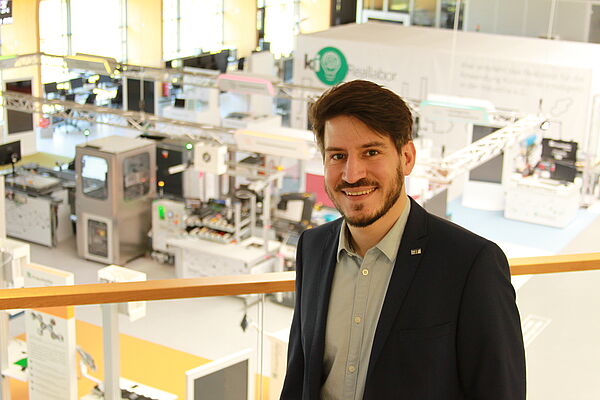Artificial intelligence (AI) is increasingly changing our working world. It supports humans in their activities and has become an indispensable part of many industries. But will it also replace humans completely at some point?
This question was addressed by inIT scientist Christoph-Alexander Holst during his presentation at the AI in the Working World theme day of IndustrialPioneersOWL. Right at the beginning, he reported on his doubts as to whether he had perhaps formulated his lecture with the title "Does AI displace human work" too pointedly. A look at the press from the past few years, however, gave him the all-clear. Headlines like "When robots take over our jobs" (ZDF) and "What will make us unique in the future?" (DIE ZEIT No. 14/2018) show how much people are really concerned about this topic.
But what actually is AI? By definition, AI is a branch of computer science that deals with the study of mechanisms of intelligent human behavior. "Artificial intelligence can be seen as a replica of human intelligence and behavior," Holst continues. Current applications, however, are exclusively in the realm of weak AI. Weak AI is no longer about imitating human thought processes, but rather developing targeted algorithms that solve specific - concretely defined - problems. The biggest driver for weak AI methods is clearly machine learning.
But back to the initial question: Will AI replace humans? The strengths of machines lie primarily in the areas of cognitive work, pattern recognition in multidimensional areas, process optimization and 24/7 monitoring. Moreover, they do not get tired. Humans, on the other hand, are characterized by their creativity and empathy. He can evaluate, decide, reason and react to the unpredictable. "All of these things make up humans, and they are crucial qualities that cannot be replaced by a machine or AI anytime soon. But the merging of humans and machines opens up new possibilities," Holst says.
At the Institute for Industrial Information Technology (inIT), various projects are investigating the possibilities of AI support. In the ML4Pro2 project, for example, automatic wear monitoring is being implemented. In this way, maintenance planning can be carried out in a more targeted and defined manner. AI can also be used as a medical assistant. With PD Assist, Parkinson's patients can be supported in their treatment and receive help with medication dosage.
With his presentation, Christoph-Alexander Holst was able to give the all-clear: Artificial intelligence will not be able to replace humans in the long term. It can support and help him. Ultimately, however, AI has created a job for more people than you have lost your job through AI.


